Picademy 3. A report of some note: and how you can be at Picademy 4
On Monday and Tuesday this week we ran our third Picademy – two days of free teacher training (aka CPD – it really is free, and there aren’t any catches) – and it was better than ever.
We make Picademy available to attend for free: it’s part of our charitable mission. Teachers of all subjects – not just computing – who want to incorporate computing and electronics into their classroom, are given two days of what we think is some of the best CPD in the world. But don’t take our word for it – if you’re interested in applying for a place on the September course (you should), here’s what the Picademy 3 cohort had to say via Twitter:
Best two days of work based stuff EVER! Cannot recommend Picademy enough.
Picademy was amazing, superb CPD, networking, hands on projects, expert support when needed.
Thank you … for the best CPD, hospitality and the wonderful things we learnt.
Best goody bag ever! I feel like I’ve been to a party. Can’t wait for tomorrow’s session! I am buzzing from Picademy! Thank you to everyone for making it such an awesome experience.
Thanks … for an excellent #picademy. Great networking and workshops! Very inspiring!
I particularly liked the bit where Clive scooted around in a Little Tikes car shouting ‘Hodor!’ to himself.
All of these are completely not made up. Except one.
Lucky bags
Lots of the attendees arrived the night before and stayed in the same hotel, and it’s great to see the social side of Picademy. As well as encouraging collaboration and team work over the two days, it helps maintain the community and network of Raspberry Pi Certified Educators afterwards.
There’s always a great buzz in the Pi Towers classroom when the group first arrives and opens up their goody bags. (These bags have been certified by independent adjudicators Bag of Tricks Inc to be the best goody bags in the whole world.) But this time we had an ace up our sleeve (and B in our bonnet). Late on the previous Friday, Eben issued the command to replace the Raspberry Pi model Bs in the bags with the as yet unreleased B+. There was much rejoicing! And this is why, one hour after the new model was announced, the good people of Picademy 3 were some of the first in the world to own and use the new model.
Day 1: filling brains with the good stuff
The first day is all about gaining experience and confidence. Workshops on Sonic Pi; physical computing; programming in Minecraft; and the Pi camera board show what can be achieved if you’re willing to have a go and to think differently, and this cohort did not disappoint. I overheard lots of comments like, “This would be perfect in the classroom…”, “The kids will love this…” and “YES! IT WORKS!” It’s an intensive but satisfying day. Teachers who had never used a Pi before were programming in Python, coding music and making LED traffic lights in Scratch. All of these new skills were preparation for the second day, or The Awesome Day of Messing About with Cool Stuff as we like to call it.
Dinner is really interesting. It’s a chance for the group to relax and chat, and to process and sort the vast amount of information that they’ve crammed into their heads during the day. So it’s an important part of the course, where ideas are shared and people start to talk about what they were going to make tomorrow. You could already see some of the projects taking shape. It’s an essential and productive hiatus, like letting meat rest after a blast in the oven or outgassing near the surface of the sea after a long dive. (I have just won a bet that I couldn’t mix cooking and diving metaphors in one sentence. Yes, Pulitzer Board: who’s laughing now?)
Day 2: TADOMAWCS
On day 2 everyone split into groups, had a nice cup of tea, did a little happy dance of creativity and then made stuff. This is the favourite day for both the attendees and the education team. There’s no pressure to produce a specific product and everyone gets to work at their own pace and in their own comfort zone. The day is about building skills and confidence, and about sharing good practice.
What I particularly enjoyed this week was watching and helping those teams that kept plugging away at problems, debugging software and troubleshooting hardware, until it worked (or nearly worked!) This problem solving, creativity and perseverance is at the heart of computing in the classroom and is what makes it special. We also had inspiring talks from Eben Upton, Lance Howarth and Rachel Rayns (Google them—it’s not as if they are called John Smith or nuffin’!)
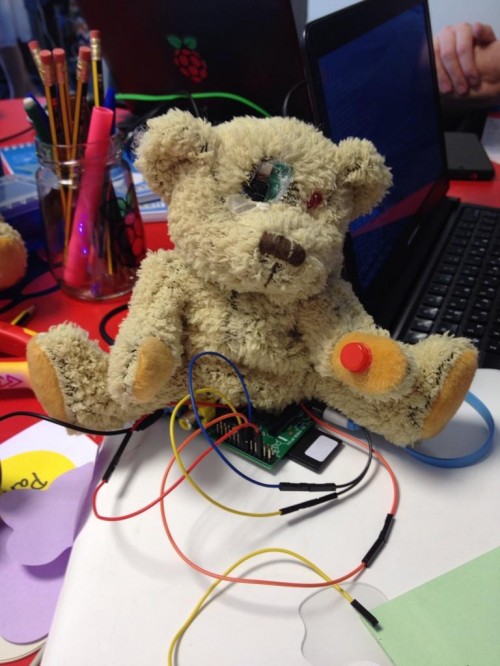
Babbage being re-purposed. I actually saw Ben Nuttall with a pair of pliers up his bum at one point.
There were some fantastic projects. Twitter-enabled projects were well represented, perhaps because many of the group were keen social media users, and this type of project has a huge appeal to students. One team wanted to do some robotics, so we scavenged an old robot and they repurposed it using a Pibrella—cheap and cheerful but with huge learning potential. We’ll be getting in a variety of motor boards and roboty things for future Picademies. We like robots.
This cohort has already impressed us with their continued collaboration and engagement via Twitter, our forums and their blogs. We know that some of them have gone back to school and are already changing things for the better, for instance by running CPD events, writing resources and setting up their classrooms to teach computing effectively. Thanks to you all for coming, you have earned your Raspberry Pi Certified Educator badges!
Picademy 4 applications now open
So it was a fantastic couple of days again and although it’s tiring for the RasPi education team at the time we never get tired of doing it. The next Picademy is in September 2014 where you are guaranteed free, world class CPD; expert support; essential skills and practical ideas to take back to your classroom. And lots of fun. (We also guarantee that you will not get: encyclopaedic PowerPoint printouts; curly, mild cheddar butties; tedious talks; or role play (well, perhaps a tiny bit of the latter. It’s the CPD law.)
Picademy 4 will look favourably on applications from teachers in the South West of England. We’re very aware of regional accessibility to training and support, and so occasionally we will focus on specific regions. So if you are a teacher in the South West, we would love to have you here. This does not mean applications are open to teachers in the South West only! Please apply wherever you are.
I cannot believe that you are still here reading my brain-drool. Apply now – and good luck!

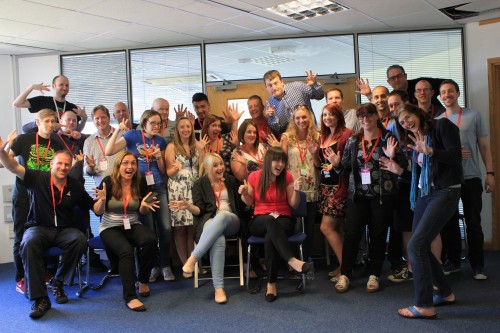
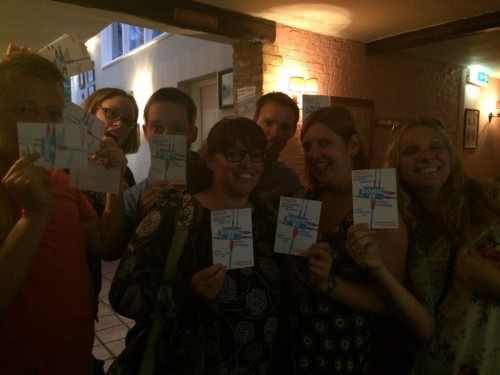
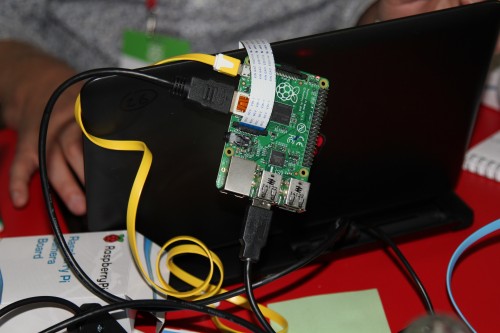
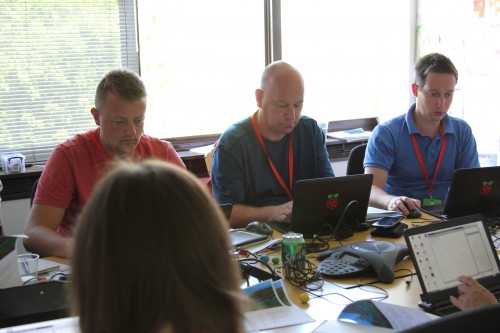
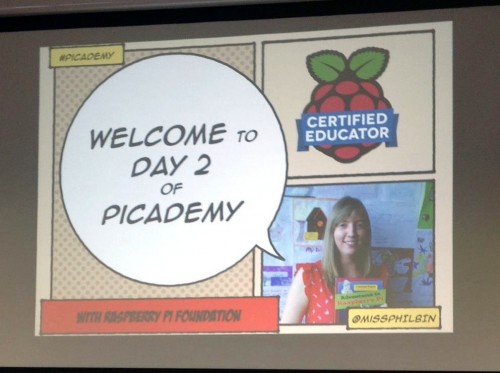
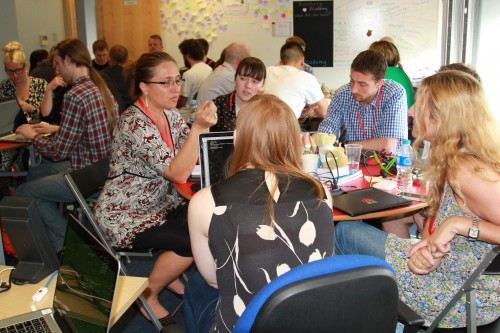
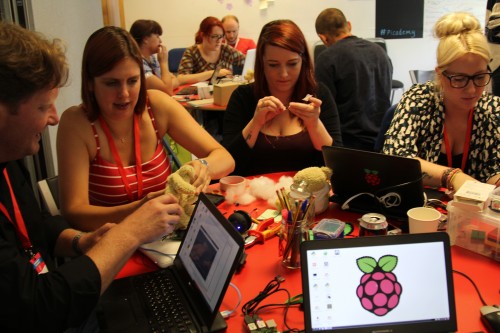
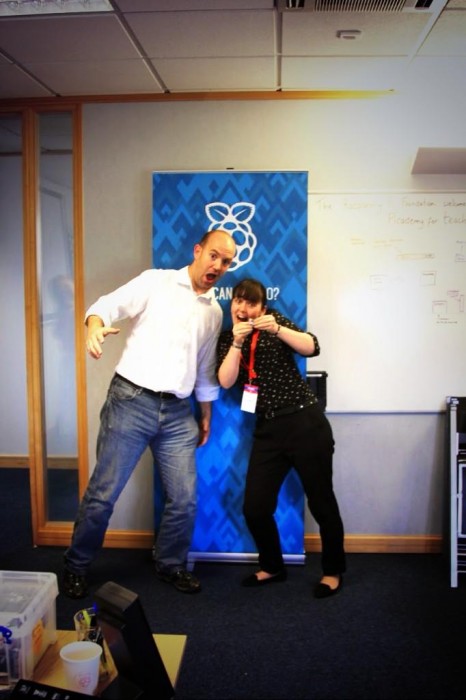

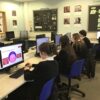




19 comments
Marc
Hi Guys, would love these to be held for non educational peeps like me :)
We use pi’s all over the place, mainly for digital dashboard screens etc.
Could you please tell me what the screen & keyboard these guys were using is?
Thanks!
Marc
Clive Beale — post author
It’s a Motorola Lapdock — designed for one of their phones but now no longer made. Prices of old stock shot up when people sussed that you could plug in a Pi and even power it with the Lapdock.
We’re only training teachers at the moment for a number of reasons but are looking at other options in the long term (we’d like to train EVERYBODY, obviously :))
Matt
Seems like a lot of fun. Too bad I’m not a teacher, would really love to get in on this as well . Any chance of a Google hangout of the classes? Something we could all watch? That would make my year lol.
Matthew Davidson
Would you recommend this for a primary school teacher?
I’m asking as I would like to send my ex- headteacher from my primary school, but now I’ve left I’d like to introduce the school to the Pi. I’m currently 12 and moving up into secondary school, and I have been following this website since the launch of the Pi but only got one at the start of this year.
Thanks, Matthew
Raspberry Pi Staff Liz Upton
Yes, absolutely. We’ve already had a large number of primary teachers participate in Picademy; they’ve all found it very helpful. (I should note that we don’t require any previous experience with Raspberry Pi, or with computing. What we’re looking for is enthusiasm and a willingness to learn.)
Mike Hague
Yes! Definitely push it to people involved in primary schools. I’m a primary teacher without any kind of formal computing background but have just come off #picademy 3. Sorry about the hashtag, it has become second nature after all the on-course tweeting.
Picademy is inspiring and is a fantastic piece of CPD for primary teachers, especially with the new computing curriculum. This course has helped me realise the huge range of creative ways to inspire, motivate and enable children to pursue their wildest ideas, whether it be a laptop-controlled robot (me and Russell created this on the course) or a cat-scaring motion-activated camera posting straight to twitter (courtesy of Tom and Laura).
I’ve been back two days, haven’t touched a computer but even how I’ve been speaking about it to colleagues and children has people fired up.
Go to picademy!
Become one of us.
One of us, one of us…
Catherine Lamin
I’m a primary school teacher and I had the most amazing time as well as learning so much. As someone who usually gets bored and falls asleep in most CPD training* I was surprised to find the time speeding by and it was actually quite upsetting when the first day drew to a close.
I entered my application with very little knowledge and had done what is referred to as the classic school approach: bought some Raspberry Pis because they sounded cool, then shelved them because I didn’t really know what else to do! I had almost no knowledge of code, but a bit of understanding of Scratch. Compared to some people I felt like I knew nothing, but it was so completely inclusive that no one ever felt left behind or too far ahead.
This course is really inspiring, without being patronising and I came away full of ideas and inspiration, but more importantly, full of contacts for a new bunch of teaching friends that I know I can turn to for support and advice both with using the Raspberry Pi and with other areas of computing.
Please recommend this course to people who are already inspiring teachers and are willing to take the plunge into becoming inspiring 21st Century Teachers!
*please don’t tell my boss
Gary Scarborough
Are there any Picademy’s being held in the US? I love the Pi and would love to see schools here start adding it to the classroom. Is there any progress being made in the US? I realize your charity is specific to the UK, but I thought maybe you would have heard of something or maybe have helped another group getting started.
Gary
Catherine Lamin
Have you seen this post: http://www.raspberrypi.org/bens-raspberry-pi-us-tour-august-2014/
Might be of some interest?
elParaguayo
Things like this make me think I’m in the wrong job!
Throughout primary and secondary school I felt like I had to hide my love of tinkering with computers because it’s not what the cool kids did (I’m not, for one second, suggesting I was ever a cool kid).
I’m really pleased to see attitudes are changing. I went to visit my son’s future school and was told about their coding classes. I was extremely jealous but, at the same time, secretly excited that I might get to help him with some of his homework…
Stewart Watkiss
Have you ever thought of becoming a volunteer with STEM Ambassador and Code Club? Sounds like you are the sort of person they are looking for.
You go into schools or clubs and teaching programming to the children. You don’t need to be a top programmer as the materials are all provided. You just need to be enthusiastic and have some time on you hands. Mostly these are run straight after school, but it’s worth checking with you employer as mine even had a policy encouraging it (although I hadn’t heard about it before). Or some run at weekends.
I have run a Code Club for one term (using Raspberry Pis) at a local primary school, but I also help out at a Raspberry Pi club at a high school and various other STEM activities.
For more details see:
STEMNET
Code Club
elParaguayo
Stewart,
Many thanks for this. I’ll definitely take a look.
The only concern is the bit about having some time on my hands. I sold out to the corporate beast many years ago and now often work very long hours and weekends (not that I’m ever too busy to help out in the Python forum when I can – plus it keeps me sane).
3xBackups
Maybe it was just me I had no idea that CPD stood for Continuous Professional Development. I was reading it going what the hell does “CPD” stand for.
Dave
Did Ben have pliers up his own bum or Babbage’s? The photo could be taken both ways ;)
Sorry couldn’t resist.
I’ll get my coat.
Catherine Lamin
Where is the ‘like’ button?
Jenny Tait
This sounds brilliant! I work in the Widening Participation team at a university in London, focusing on primary school kids. I’d love to run activities on campus for school visits using Raspberry Pi’s, would I be able to attend one of these CPD days?
Íris
Hi. I am a teacher in Iceland and would love to learn how to use the Pi in the classroom. Do you have any books or online classes that I could checkout?
Raspberry Pi Staff Liz Upton
Check out the Resources tab at the top of the page.
Íris
Thank you :)